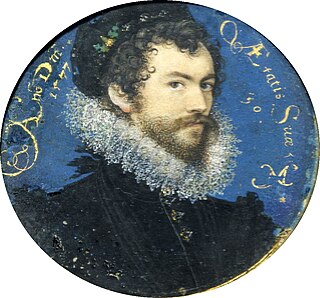
Carlo Gesualdo da Venosa was Prince of Venosa and Count of Conza. As a composer he is best known for writing intensely expressive madrigals and pieces of sacred music that use a chromatic language not heard again until the late 19th century. The best known fact of his life is his brutal and violent killing of his first wife and her aristocratic lover upon finding them in flagrante delicto. The fascination for his music and for his crimes have gone hand in hand.
Luzzasco Luzzaschi was an Italian composer, organist, and teacher of the late Renaissance. He was born and died in Ferrara, and despite evidence of travels to Rome it is assumed that Luzzaschi spent the majority of his life in his native city. He was a skilled representative of the late Italian madrigal style, along with Palestrina, Wert, Monte, Lassus, Marenzio, Gesualdo and others.

Luca Marenzio was an Italian composer and singer of the late Renaissance. He was one of the most renowned composers of madrigals, and wrote some of the most famous examples of the form in its late stage of development, prior to its early Baroque transformation by Monteverdi. In all, Marenzio wrote around 500 madrigals, ranging from the lightest to the most serious styles, packed with word-painting, chromaticism, and other characteristics of the late madrigal style. Marenzio was influential as far away as England, where his earlier, lighter work appeared in 1588 in the Musica Transalpina, the collection that initiated the madrigal craze in that country. Marenzio worked in the service of several aristocratic Italian families, including the Gonzaga, Este, and Medici, and spent most of his career in Rome.
Pomponio Nenna was a Neapolitan Italian composer of the Renaissance. He is mainly remembered for his madrigals, which were influenced by Gesualdo, and for his polychoral sacred motets, posthumously published as Sacrae Hebdomadae Responsoria in 1622.

Maddalena Casulana was an Italian composer, lutenist and singer of the late Renaissance. She is the first female composer to have her music printed and published in the history of western music.
Giovanni de Macque was a Netherlandish composer of the late Renaissance and early Baroque, who spent almost his entire life in Italy. He was one of the most famous Neapolitan composers of the late 16th century; some of his experimentation with chromaticism was likely influenced by Carlo Gesualdo, who was an associate of his.

The Hilliard Ensemble was a British male vocal quartet originally devoted to the performance of early music. The group was named after the Elizabethan miniaturist painter Nicholas Hilliard. Founded in 1974, the group disbanded in 2014.
José Miguel Moreno is a Spanish specialist of historical plucked string instruments, such as the vihuela, lute, theorbo, and guitars. In 1977 he won the First Prize of the Incontri Chitarristici di Gargnano (Italy) and later many awards for his recordings. He has undertaken recordings and live concerts with the renowned ensemble "Hesperion XX" and Jordi Savall as well as with his own formations La Romanesca and Orphenica Lyra - after the book Orphénica Lyra (1554) of Miguel de Fuenllana. He is also, with his brother violist Emilio Moreno, co-founder of the Spanish classical music label Glossa Music.

The concerto delle donne was a group of professional female singers in the late Renaissance court of Ferrara, Italy, renowned for their technical and artistic virtuosity. The ensemble was founded by Alfonso II, Duke of Ferrara, in 1580 and was active until the court was dissolved in 1597. Giacomo Vincenti, a music publisher, praised the women as "virtuose giovani", echoing the sentiments of contemporaneous diarists and commentators.

Collegium Vocale Köln is a German vocal ensemble, founded in 1966 as a quintet when its members were still students at the Rheinische Musikschule in Cologne. It is directed by Wolfgang Fromme, who also sings tenor in the ensemble. They are best known as the group for which Karlheinz Stockhausen composed Stimmung in 1968, a work which they had performed more than three hundred of times throughout the world by 1986. The original impetus for the ensemble's founding, however, was an appearance by Alfred Deller at the Cologne Courses for Early Music, and the group has always performed both early and contemporary works.
Delitiae Musicae is an Italian classical instrumental and vocal ensemble. There is no relation to the Spanish lute duo Delitiae Musicae on the Brilliant label.
Oltremontani were those of the Franco-Flemish School of composers who dominated the musical landscape of Northern Italy during the middle of the sixteenth Century. The role of the oltremontani composers at the ducal courts of Italy was analogous to the dominance at the Spanish court of the Flemish chapel, and other composers of the Franco-Flemish School in Germany and France.
Harry van der Kamp is a Dutch bass singer in opera and concert. Mostly active in Historically informed performance, he founded the Gesualdo Ensemble. He is also an academic voice teacher.
Scipione Lacorcia was a Neapolitan composer of madrigals.

amarcord is a German male classical vocal ensemble based in Leipzig, founded in 1992 by five former members of the Thomanerchor. They primarily perform Medieval music, Renaissance music as well as collaborating with contemporary composers. Until 2013, the group's name was ensemble amarcord.
Singer Pur is a German vocal sextet founded in 1991 by five former members of the Regensburger Domspatzen to sing jazz repertoire. In 1994 a soprano joined the group and since then Singer Pur focussed more and more on early and romantic music. But the vocal ensemble has no stylistic limitations and its programmes include anything performable by voices. Singer Pur has recorded more than 20 CDs. Singer Pur has given concerts and workshops in more than 50 countries all over the world.









